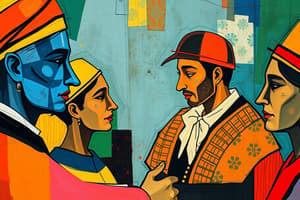Podcast
Questions and Answers
Human cultural variation is important for understanding social differences.
Human cultural variation is important for understanding social differences.
True (A)
Political identities do not have any significance in society.
Political identities do not have any significance in society.
False (B)
Food taboos are an example of observations related to cultural behavior.
Food taboos are an example of observations related to cultural behavior.
True (A)
Transnational families are a phenomenon associated with social change.
Transnational families are a phenomenon associated with social change.
The significance of studying culture, society, and politics is irrelevant to social actors.
The significance of studying culture, society, and politics is irrelevant to social actors.
Flashcards are hidden until you start studying
Study Notes
Understanding Culture, Society, and Politics
- Culture, society, and politics provide foundational aspects for understanding human interactions and structures.
- Students bring diverse social and cultural backgrounds to the learning environment, influenced by gender, socioeconomic class, ethnicity, religion, and nationality.
- Observing behaviors and phenomena such as food taboos and political dynasties can reveal insights into societal dynamics.
- Social, political, and cultural changes are evident in trends like texting, transnational families, and youth volunteerism.
Content Standard
- Emphasis on comprehending human cultural variation, social differences, social change, and political identities.
- Importance of studying culture, society, and politics as integral to understanding human experiences.
Definition of Culture, Society, and Politics
- Society is defined as a group of individuals sharing a common culture.
- Culture encompasses a range of elements including beliefs, practices, values, laws, artifacts, and symbols, and is characterized by:
- Dynamic, flexible, and adaptive nature.
- Shared yet contested characteristics reflecting social differences and interests.
- Learned behaviors through processes of socialization and enculturation.
- A patterned construct that is both integrated and sometimes unstable.
- Essential roles of language and socialized thoughts in cultural transmission.
Different Perspectives of Culture, Society, and Politics
- Concepts of culture, society, and politics form a triad that shapes human interaction.
- Various approaches to studying these concepts include comparative, historical, structural-functional, interpretive, and critical perspectives.
Communication and Cultural Perspectives
- Key communications and interrelations play a critical role in understanding human origins and their impact on cultural processes.
- Ethnocentrism and cultural relativism guide perspectives on culture’s influence in human adaptation.
- Politics involves governance, public affairs, and the mechanisms of compromise, consensus, and power dynamics.
Historical Context of Human Evolution
- The evolutionary journey spans from biological and cultural evolution of Homo species to Homo sapiens.
- Cultural and sociopolitical evolution includes significant transformative periods:
- The Neolithic Revolution marked the transition from hunting and gathering to agriculture.
- Rise of early civilizations accompanied the development of state structures.
- Processes of democratization signify ongoing political development and societal diversity.
Studying That Suits You
Use AI to generate personalized quizzes and flashcards to suit your learning preferences.




